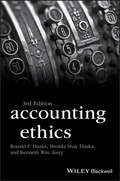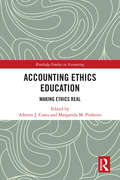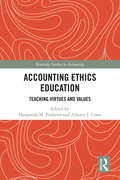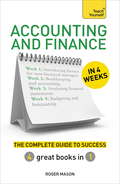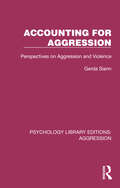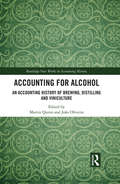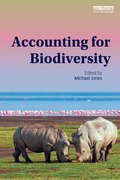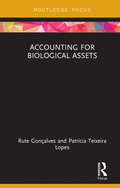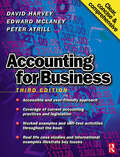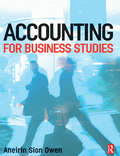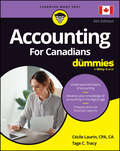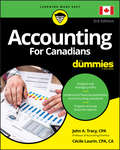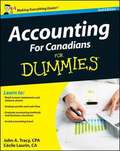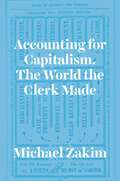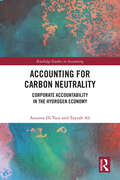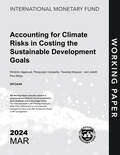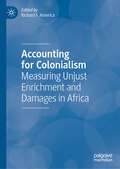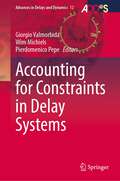- Table View
- List View
Accounting Ethics (Foundations of Business Ethics #5)
by Brenda Shay Duska Ronald F. Duska Kenneth Wm. KuryAn accountant’s practice depends on making difficult decisions. To achieve the best results, individual accountants and accounting firms need a clear understanding of the ethical duties and decision-making involved in the four major functions of modern accounting—auditing, management accounting, tax accounting, and consulting—as well as a strong sense of ethical conduct to guide the certification and validation of reliable financial records. Now in its third edition, Accounting Ethics is a thorough and engaging exploration of the ethical issues that accountants encounter in their professional lives. Since the publication of the first edition in 2002, Accounting Ethics has become an indispensable resource for accounting courses and certification programs worldwide, known for its focus on real-world application, practical advice, reader-friendly guidance, and its insight into the effects of global change on the profession. Together with coverage of the contemporary regulatory environment—including the Sarbanes-Oxley Act, the Public Company Accounting Oversight Board, and the Dodd–Frank Wall Street Reform and Consumer Protection Act—this revised edition features expanded pedagogical resources such as new end-of-chapter case studies and discussion questions, and includes the updated AICPA Code of Conduct. Concise and dependable, Accounting Ethics sustains its reputation as an authoritative resource for practicing accountants, new professionals, students of accounting, and those who are considering the profession.
Accounting Ethics Education: Making Ethics Real (Routledge Studies in Accounting)
by Alberto J. Costa; Margarida M. PinheiroAccounting education ought to prepare future professionals to enter a principles-based, rules-oriented field of activity wherein technical knowledge of accounting standards (principles, rules and decision procedures) and ethical awareness (the capacity to discern moral issues and resolve ethical dilemmas) are crucial. Accounting education is best performed by the accountant’s adherence to the principles of the accounting profession and by individuals and firms following the appropriate rules, act according to the codes of conduct adopted by their profession, exercise clear judgment whenever they address financial transactions and consider/assess the state of a given business. Accounting Ethics Education: Making Ethics Real gathers a diversity of contributions from invited well-known experts and other specialists. It promotes comprehensive reflection around key trends, discussing and highlighting the most updated research on accounting ethics education, being an essential and useful reference in the field. In the performance of accounting tasks, the accountant should be educated and supported in the skills development and habit formation to solve accounting problems, recognize moral issues and resolve ethical dilemmas that will be encountered in their special tasks. Also, this book provides a moral map for identifying and acting on values when difficult situations arise. Examining multiple perspectives, the book improves the scholarly debate by providing cutting-edge and insightful research vital for all those interested and immersed in these matters. It will be of great value to academics, students, researchers and professionals in the fields of accounting, accounting education and ethics.
Accounting Ethics Education: Teaching Virtues and Values (Routledge Studies in Accounting)
by Margarida M. Pinheiro; Alberto J. CostaAccounting Ethics Education: Teaching Virtues and Values gathers a diversity of contributions from invited, well-known experts. It promotes a comprehensive reflection around how ethics can and should be taught to accounting students, discussing and highlighting the most updated research on accounting ethics education, and it is an essential reference in the field. The subject of accounting ethics education is critical to foster ethical awareness that may prevent the way in which one acts or behaves, especially towards others. The point is that accounting education cannot exist without ethical education and accountants must be technically proficient and ethically sensible since ethical behavior is vital to the status and credibility of the accountancy profession. And this sensibility must be developed while the future professional is still cultivating his or her moral and intellectual structure within the school learning environment: character and practical reasoning are crucial because they include not only knowledge of rules and principles, and their correct application but also values and virtues. Examining multiple perspectives, Accounting Ethics Education: Teaching Virtues and Values advances the scholarly debate by providing cuttingedge and insightful research vital for all those interested and immersed in these matters. It begins with a historical perspective of accounting ethics education and continues by exploring challenges, opportunities and developments in the area. It will be of great value to academics, students, researchers and professionals in the fields of accounting, accounting education and ethics.
Accounting & Finance in 4 Weeks: The Complete Guide to Success: Teach Yourself
by Roger MasonWhatever your degree of prior knowledge, this 28-day course will put you on the path to business success. It includes four tried-and-tested bestselling titles - Finance For Non-Financial Managers In a Week; Accounting and Bookkeeping In a Week; Successful Budgeting and Forecasting in a Week; and Analysing Financial Statements in a Week. Each day of the course is packed with proven and practical advice, and is rounded off by a quiz which helps you ensure you have understood the key areas.
Accounting & Finance in 4 Weeks: The Complete Guide to Success: Teach Yourself
by Roger MasonAccounting And Finance In 4 Weeks is a comprehensive guide to understanding finance, giving you everything you need to know in one place. Made up of four bestselling books in one, this book delivers a complete course in the essentials. From balance sheets and profit statements to cashflow, budgets and forecasts you'll discover all the tools, techniques and strategies you need to get up to speed.This book introduces you to the main themes and ideas of finance and accounting, giving you a knowledge and understanding of the key concepts, together with practical and thought-provoking exercises. Whether you choose to work through it like a 4 week course or dip in and out, Accounting And Finance In 4 Weeks is your fastest route to success:Week 1: Finance For Non-Financial Managers In A WeekWeek 2: Bookkeeping And Accounting In A WeekWeek 3: Understanding And Interpreting Accounts In A WeekWeek 4: Successful Budgeting And Forecasting In A WeekABOUT THE SERIESIn A Week books are for managers, leaders, and business executives who want to succeed at work. From negotiating and content marketing to finance and social media, the In A Week series covers the business topics that really matter and that will help you make a difference today. Written in straightforward English, each book is structured as a seven-day course so that with just a little work each day, you will quickly master the subject. In a fast-changing world, this series enables readers not just to get up to speed, but to get ahead.
Accounting for Affection
by Caroline CastiglioneAccounting for Affection examines the multifaceted nature of early modern motherhood by focusing on the ideas and strategies of Roman aristocratic mothers during familial conflict. Illuminating new approaches to the maternal and the familial employed by such women, it demonstrates how interventions gained increasing favor in early modern Rome.
Accounting for Aggression: Perspectives on Aggression and Violence (Psychology Library Editions: Aggression)
by Gerda SiannThe despair and incomprehension that often seem to be the only possible response to acts of aggression and violence have led to attempts by academics and writers from a wide variety of backgrounds to understand and explain such behaviour. The concern and anxiety that is felt by many people about this subject is such that some of their accounts – notably by Konrad Lorenz, Desmond Morris, Robert Ardrey, and Anthony Storr – have become popular and even best-selling books.Originally published in 1985, Accounting for Aggression provides a comprehensive synthesis and assessment of these writings and other contemporary theory and research on aggression and violence at the time. The author presents a variety of accounts of aggression, drawing on original work in the areas of biology, sociobiology, ethology, psychology and sociology. Each account is evaluated according both to the criteria of scientific methodology and to the extent to which it illuminates our understanding and appears to have a lasting explanatory value. In the last chapter the author presents an integrative approach to the subject area which synthesizes those findings for which there appears to be substantial empirical support, within a framework of the meaning that aggressive and violent behaviour offers to those who carry it out.Accounting for Aggression will be of great value to students and practitioners in the fields of psychology, psychiatry, social work and education. Furthermore, it will be welcomed by interested members of the general public who are concerned with issues such as whether or not violence is inherent in human nature, the extent to which interpersonal violence is related to group violence, and the extent to which violence in the media affects violent behaviour.
Accounting for Alcohol: An Accounting History of Brewing, Distilling and Viniculture (Routledge New Works in Accounting History)
by Martin Quinn João OliveiraConsumption of alcohol is a globally ubiquitous, often controversial activity, and business organizations in this sector are of significant social and economic relevance. This book draws on accounting records from the sector to reveal fresh and unique insights into the historic development of the production of alcoholic beverages. Offering a historic overview of the three major areas of the alcohol industry – brewing, distilling and wine – this book reveals the commonalities and differences which are present in the industry, while also highlighting its social impact. The editors bring together contributions from around the world, including Mexico, France, Japan and Ireland, to demonstrate how accounting has developed over time. Offering diverse geographical and historical perspectives, it explores multiple aspects of accounting within the industry, including internal control, earnings management, competition, and regulatory aspects. The fascinating insights into breweries, wineries, spirit distillers, vineyards and other related organizations provides a unique historic perspective of accounting systems, techniques and practices. Drawing on an international range of examples and rich archival material, this valuable research collection will be of great interest to researchers and advanced students of accounting and business history.
Accounting for Asset-Backed Securitization
by Gregory S. Miller Jacob CohenIntroduces the basic concept of asset securitization and the accounting for these transactions.
Accounting for Biodiversity: Accounting For Biodiversity
by Michael Jones‘Biodiversity’ at its simplest, refers to the variety of species inhabiting Planet Earth. It is essential to the well-being of the planet. There is now a scientific consensus around the current ongoing crisis in biodiversity arising from both climate change and human activities. Experts believe we are in the middle of a mass extinction of biodiversity with devastating consequences for our planet. Accounting for Biodiversity explores the need for companies to actively protect, conserve and improve biodiversity within their sphere of operation. The 14 chapters written by a selected team of experts investigate the ways in which companies are embracing their responsibility through a variety of biodiversity initiatives and innovative models designed to improve the recording, reporting and valuing of biodiversity. Global case studies look at biodiversity accounting in Africa, Asia, Australasia, Europe and South America. Overall, this book provides a comprehensive set of reflections on accounting for biodiversity and recommendations for the future. This book is essential reading for all those interested in the contribution that accounting can make to the preservation of biodiversity. As we see increasing awareness of the importance of sustainability and ecological responsibility in business activity it is relevant and should prove informative to students, managers, accountants and those in business more generally. It is also important for all those interested in conserving biodiversity.
Accounting for Biological Assets (Routledge Focus on Business and Management)
by Rute Gonçalves Patrícia Teixeira LopesThis book explores accounting for biological assets under IAS 41 – Agriculture, and explains the recent adjustments introduced by the IASB which allow firms to choose between cost or revaluation models concerning mature bearer plants. Identifying the firm and country-level drivers that inform the disclosure and measurement practices of biological assets, this concise guide examines the value relevance of measuring those assets at fair value. It also analyses how firm and country-level drivers explain the differences in the disclosure level and practices used to measure biological assets under IAS 41. Finally, it evaluates whether there is a difference in the relevance of biological assets among the listed firms with high and low disclosure levels on biological assets. Based on a major international study of a wide selection of firms and country-level drivers, this book is vital for standard setters, stakeholders, students, accountants and auditors who need to understand disclosure and measurement practices of biological assets under IAS 41.
Accounting for Business
by David Harvey Edward McLaney Peter Atrill'Accounting for Business' is ideal for undergraduate students on business and accounting courses who need to understand the nuts and bolts of financial accounting. This popular textbook has always enjoyed a deserved reputation for accessibility and thoroughness. Now in its third edition, its contents have been fully updated and restructured to make them even easier to use. Readers will benefit from the coverage of current accounting practices and legislation, in addition to the range of worked examples and self-test activities throughout the book. 'Accounting for Business' clearly explains accounting information's role in making sound business decisions and focuses upon the aspects of accounting practice which are most relevant to the non-specialist manager. It is ideal for first year undergraduates of business studies, higher students and those pursuing professional accountancy qualifications.This third edition has been restructured, to further enhance its 'student centred' approach. The content has now been broken down into 25 roughly equivalent 'bite-sized' individual study topics. Each of these requires 6 hours of study time, enabling this book to support a full scale semester course with two topics a week, or a full year course at one topic a week. Includes a wide selection of topical case studies, with a broad spread of international examples.
Accounting for Business Combinations: Acquisition Method
by F. Asis Martinez-Jerez David F. HawkinsA technical note reviewing business combinations and Goodwill accounting, under the Statement of Financial Accounting Standards, No. 141R.
Accounting for Business Studies
by Aneirin OwenBusinesses are complex, and, as a result, teachers face a difficult task developing students' understanding of how they work, especially in the global context. Accounting for Business Studies helps teachers focus on modern commercial issues and integrates accounting into business and management studies. This book includes: * A business perspective rather than an accounting perspective* e-business, including case studies* Globalisation, including case studies* Business skills, like interpretation, analysis and communication* IT integrated into specific business situations* Includes models such as Porter's Five Forces, Supply Chain, Product Life Cycle
Accounting For Canadians For Dummies
by Cecile Laurin Tage C. TracyThe only guide to accounting that’s tailor-made for Canadians Accounting For Canadians For Dummies provides comprehensive coverage of all the auditing concepts, practices, and regulations Canadians need to know. This trusted guide is full of great information applicable to accountants and auditors who work throughout private industry and government, as well as salary accountants working for accounting, tax preparation, bookkeeping, and payroll services firms. Financial statements, financial reports, and business accounting are explained in terms anyone can understand. This new edition is revised to include accounting in the digital age, applying techniques from Wall Street, capitalizing a business, and beyond. This Dummies guide paves an easy-to-follow path to success for students and professionals alike. Understand the basics of general accounting procedures Learn the ins & outs of Canadian regulations Prepare and analyze financial reports, and create professional financial statements Discover how to track inventory and evaluate profit marginsAccounting For Canadians For Dummies is the ideal book for both accounting professionals and students working towards a degree in accounting or auditing.
Accounting For Canadians For Dummies
by John A. Tracy Cecile LaurinAs the demand for on-the-money accounting expertise grows in Canada’s increasingly complex public and private business landscape, current and future accounting professionals need a comprehensive resource that’s tailored specifically to their financial world. This revised edition takes you through what you need to know in straightforward language, from the basics to advanced issues such as income statements and balance sheets, budgets and budgeting, and the ins and outs of the GAAP. <p><p> In addition to advice on general accounting procedures, Accounting For Canadians For Dummies includes coverage of the latest regulations in all areas of the Canadian economy, keeping you on the right side of the law as it applies to government, public, and private sectors. The book is also a must-have for salary accountants working for accounting, tax preparation, bookkeeping, and payroll services firms.
Accounting For Canadians For Dummies
by John A. Tracy Cecile LaurinThe only guide to accounting tailor-made for Canadians, now revised and updatedJob prospects are good for those looking to enter the Canadian accounting industry, and Accounting For Canadians, Second Edition is the essential resource for anyone interested in doing so. Packed with the information accountants and auditors who work in public and private industries and in government need to know in order to stay on the right side of Canadian accounting law, the book is also a must-have for salary accountants working for accounting, tax preparation, bookkeeping, and payroll services firms.Essential reading since the new GAAP became mandatory for publicly accountable enterprises and government business enterprises at the beginning of 2011Covers the new International Financial Reporting Standards Addresses new standards for private enterprises that business leaders need to knowStill the only trade book that covers Canadian accounting practicesThe ideal book for both accounting professionals as well as students who are currently working towards a degree in accounting or auditing services, Accounting For Canadians For Dummies provides the applicable and helpful advice that you need to succeed.
Accounting for Capitalism: The World the Clerk Made
by Michael ZakimThe clerk attended his desk and counter at the intersection of two great themes of modern historical experience: the development of a market economy and of a society governed from below. Who better illustrates the daily practice and production of this modernity than someone of no particular account assigned with overseeing all the new buying and selling? In Accounting for Capitalism, Michael Zakim has written their story, a social history of capital that seeks to explain how the “bottom line” became a synonym for truth in an age shorn of absolutes, grafted onto our very sense of reason and trust. This is a big story, told through an ostensibly marginal event: the birth of a class of “merchant clerks” in the United States in the middle of the nineteenth century. The personal trajectory of these young men from farm to metropolis, homestead to boarding house, and, most significantly, from growing things to selling them exemplified the enormous social effort required to domesticate the profit motive and turn it into the practical foundation of civic life. As Zakim reveals in his highly original study, there was nothing natural or preordained about the stunning ascendance of this capitalism and its radical transformation of the relationship between “Man and Mammon.”
Accounting for Carbon
by Bellassen, Valentin and Stephan, Nicolas Valentin Bellassen Nicolas StephanThe ability to accurately monitor, record, report and verify greenhouse gas emissions is the cornerstone of any effective policy to mitigate climate change. Accounting for Carbon provides the first authoritative overview of the monitoring, reporting and verification (MRV) of emissions from the industrial site, project and company level to the regional and national level. It describes the MRV procedures in place in more than fifteen of the most important policy frameworks - such as emissions trading systems in Europe, Australia, California and China, and the United Nations Framework Convention on Climate Change - and compares them along key criteria such as scope, cost, uncertainty and flexibility. This book draws on the work of engineers and economists to provide a practical guide to help government and non-governmental policy makers and key stakeholders in industry to better understand different MRV requirements, the key trade-offs faced by regulators and the choices made by up-and-running carbon pricing initiatives.
Accounting for Carbon Neutrality: Corporate Accountability in the Hydrogen Economy (Routledge Studies in Accounting)
by Assunta Di Vaio Tayyab AliDespite the progress made so far, the links between environmental, social and governance (ESG) sustainability pillars remain underexplored, particularly in the context of firms investing in hydrogen for decarbonization. In essence, hydrogen is a lynchpin connecting engineering ingenuity, economic viability, and strategic business decisions. Its multifaceted role underscores its significance in addressing contemporary challenges, driving innovation, and shaping a sustainable future through the accounting system.This book unravels the complexities of carbon control practices, offering insights into financial, operational, and sustainable dimensions. From the challenges of sustainability transitions and technology adoption to utilize renewable resources and disclosing decarbonization practices, the book explores the critical role of accounting tools and international regulatory frameworks like the United Nations 2030 Agenda, the European Union Green Deal, and Paris Agreement as organizational collective responsibility in shaping a sustainable future.By incorporating stakeholder, stewardship, legitimacy, institutional, resource dependency theories, the book bridges gaps in academic research and offers a fresh perspective on decarbonization in the hydrogen sector. The qualitative methodology provides a unified vision from strategies to implementation, guiding companies toward the contribution of the carbon neutrality goal in the hydrogen economy while ensuring accountability for their actions, conduct, and sustainability reporting.
Accounting for Climate Risks in Costing the Sustainable Development Goals
by Pico-MejiaA report from the International Monetary Fund.
Accounting for Colonialism: Measuring Unjust Enrichment and Damages in Africa
by Richard F. AmericaThis book examines qualitatively and quantitatively the exploitation of African through colonialism and imperialism. The contribution included build on previous qualitative analyses of the effects of imperialism and colonialism in Africa. Chapters expand on that body of work and introduce new ways to measure some of the benefits that accrued to Europe and North America through centuries of systematic underpayments and overcharges that one can consider abuse of dominance. The collection also adds to an ongoing process that is related to the growing work related to reparations. This book, thereby, contributes to a process of changing international development assistance policy. It helps to create a basis for officially estimating the continuing gains from past and current actions against African economic, social, and political institutions and systems. This edited volume, which showcases a diversity of scholars and their perspectives, attempts to establish wrongful benefits and damages from almost 600 years of international harm to the African continent.
Accounting for Constraints in Delay Systems (Advances in Delays and Dynamics #12)
by Giorgio Valmorbida Wim Michiels Pierdomenico PepeTime-delays are fundamental to understand phenomena in control applications as networked systems, traffic management, control of vibrations, and supply chains. The need for a performance and reliability on these systems has to overcome challenges related to the constraints in the controlled systems. These constraints can be physical, such as input magnitude saturation on actuators, or technological, such as the limited bandwidth in a networked system or the fixed structure in a control architecture, where only a few parameters can be set. This volume provides a wide-ranging collection of methods for the analysis and design of control laws for delay systems with constraints. These methods cover fundamental analytical aspects as, for instance, the stability analysis of Positive Delay systems or the achievable performance of PID controls for delay systems. The book gives valuable material for researchers and graduate students in Automatic Control.
